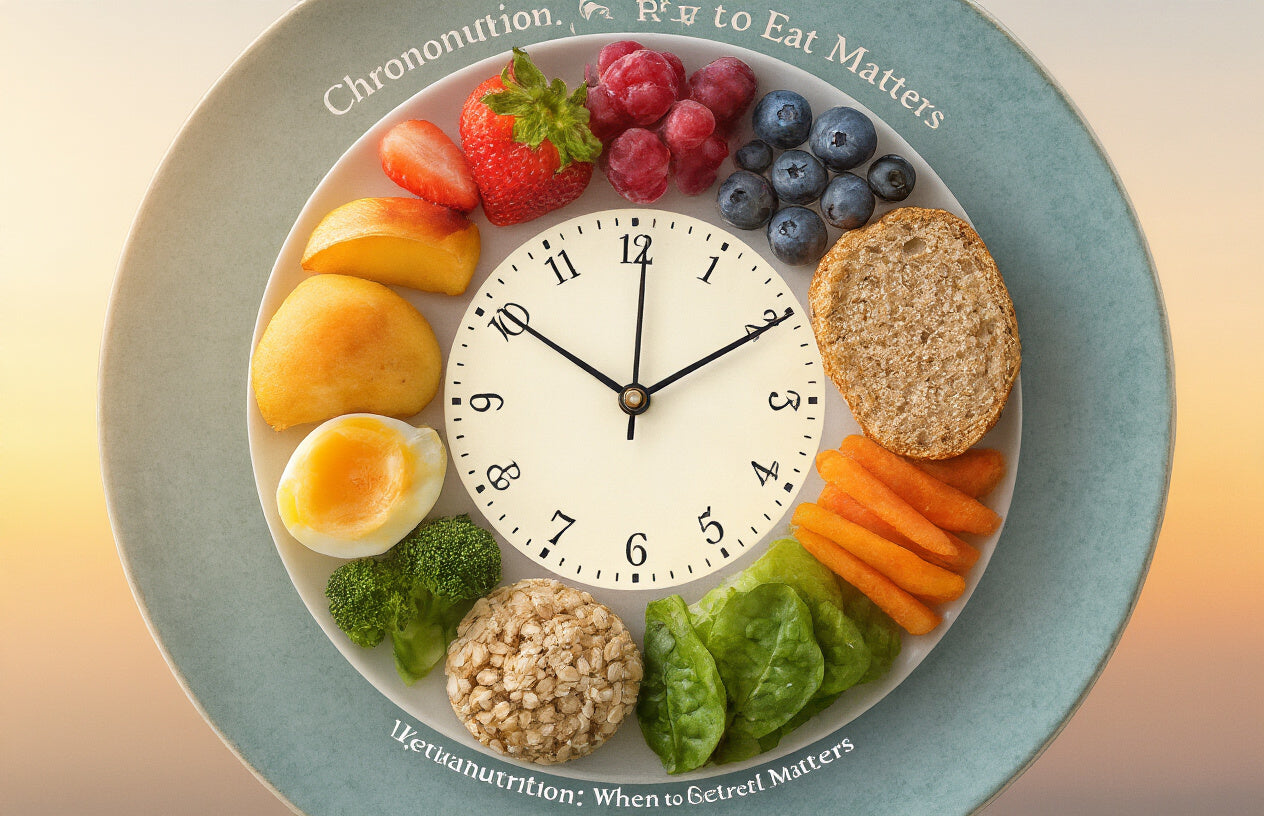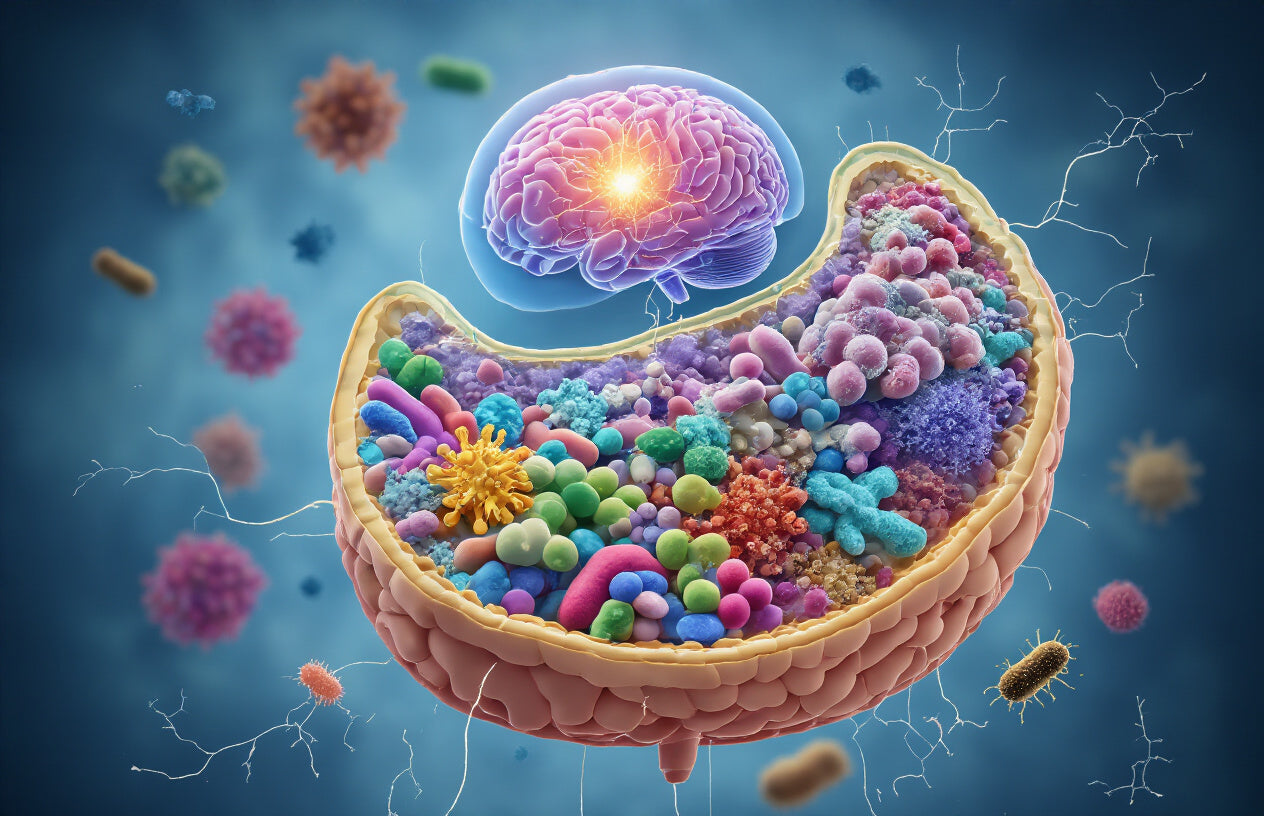Chrononutrition: When to Eat Matters
Timing your meals can be just as important as what you eat. For health-conscious individuals looking to optimize their nutrition, chrononutrition offers a fresh perspective on dietary habits. This guide explores how aligning your eating schedule with your body's internal clock can improve digestion and overall wellness. We'll cover the science behind meal timing, how to create optimal eating windows that support your digestive system, and practical strategies you can implement starting today.
Understanding Chrononutrition: The Science of Meal Timing

How your body's internal clock affects digestion
Ever noticed you get hungry at the same times each day? That's your internal clock talking. Your body runs on a natural 24-hour cycle that controls practically everything, including when your stomach growls.
Here's what's really happening: Your digestive system isn't always working at full capacity. It ramps up and slows down throughout the day based on your internal clock, also called your circadian rhythm.
Your digestive enzymes? They peak during daylight hours. Stomach acid production? Highest around noon. Insulin sensitivity? Much better in the morning than late at night.
That midnight snack habit might be more problematic than you thought. Your body simply isn't prepared to process food efficiently during the wee hours.
The connection between circadian rhythms and metabolism
Your metabolism isn't consistent throughout the day. It's like a roller coaster with predictable ups and downs.
Morning hours? That's when your metabolism is firing on all cylinders. Your body is primed to burn calories and process carbohydrates most efficiently before 2 PM.
After sunset, your metabolic rate naturally downshifts. Your insulin sensitivity drops, making it harder for your body to process sugar. Fat storage mechanisms kick into high gear. Not ideal timing for that bowl of ice cream.
The research is crystal clear: People who eat identical meals at different times of day experience completely different metabolic responses. Same food, different timing, wildly different results.
Why timing matters as much as what you eat
The perfect diet on an imperfect schedule is like having a sports car but driving it through mud.
Eating window matters tremendously. Studies show that extending your overnight fast to 12+ hours can improve everything from weight management to gut health.
Break your fast too late (like skipping breakfast altogether), and you might find yourself with poorer blood sugar control throughout the entire day.
Consume your largest meal too late, and your body stores more of those calories as fat instead of burning them as energy.
Even hydration timing affects digestive efficiency. Morning water on an empty stomach jumpstarts your metabolism in ways that afternoon water simply cannot match.
Research breakthroughs in chrononutrition
Scientists used to think calorie counting was everything. Now we know better.
Groundbreaking research from the Salk Institute found that mice eating within an 8-10 hour window, even consuming the same number of calories as mice who ate whenever, had significantly better metabolic health.
Human studies confirm these findings. A 2020 review in the British Medical Journal found that eating later in the day was consistently associated with higher obesity rates and poorer metabolic health.
The most exciting research centers around "peripheral clocks" - timing systems in individual organs including your liver, pancreas, and intestines. Each has its own optimal schedule for processing nutrients.
Time-restricted eating studies show promising results for weight management, insulin resistance, and even gut microbiome diversity - without changing a single thing about what people eat.
Optimal Eating Windows for Maximum Health Benefits

A. Morning metabolic advantages: Why breakfast matters
Ever noticed how you feel more energized after that morning meal? That's your metabolism kicking into high gear. Eating within the first hour after waking triggers what scientists call the thermic effect of food - basically, your body burns calories just digesting what you eat.
But timing matters more than you think. Having breakfast before 9 AM aligns perfectly with your circadian rhythm, that internal clock governing everything from hormone release to digestion efficiency.
Skip breakfast regularly? You're probably fighting an uphill battle with blood sugar control and hunger hormones. Studies show breakfast-skippers tend to overeat later and have higher insulin responses when they finally do eat.
The breakfast sweet spot seems to be protein-rich foods within 30-60 minutes of waking. Think eggs, Greek yogurt, or a protein smoothie - foods that stabilize blood sugar and keep you full longer.
B. The ideal lunch timing for energy and performance
Noon to 2 PM isn't just when everyone happens to take lunch - it's actually when your digestive fire burns hottest. Your body's primed for nutrient absorption during this window.
Eating too late (after 3 PM) can trigger that dreaded afternoon slump. Your digestive system works harder when it should be supporting your brain function.
The perfect lunch schedule? About 4-5 hours after breakfast. This timing maintains steady energy levels without the crash that comes from waiting too long between meals.
For peak mental performance, lunch should be balanced but not heavy. The carb-to-protein ratio matters tremendously. Too many carbs? Hello, food coma. Too few? Your brain lacks the glucose it needs for optimal function.
C. Evening eating: Timing dinner for better sleep and digestion
Eating dinner at 9 PM then hitting the bed at 10 PM is a recipe for indigestion and poor sleep. Your digestive system needs time to do its job before you lie down.
The sweet spot for dinner timing falls about 3 hours before bedtime. This gives your body enough time to digest properly while ensuring your blood sugar remains stable throughout the night.
Late-night eating messes with melatonin and growth hormone production - both critical for quality sleep and overnight tissue repair. When you eat late, these hormones can't do their job properly.
Your dinner digestion efficiency actually decreases as the day progresses. The same meal at 6 PM versus 9 PM will be processed differently by your body, with the later meal more likely to be stored as fat.
D. The pros and cons of time-restricted eating
Time-restricted eating isn't just a trend - it's tapping into your body's natural metabolic patterns. Limiting your eating window to 8-10 hours can significantly improve insulin sensitivity and reduce inflammation markers.
But it's not all sunshine and rainbows. Too narrow an eating window (like 4 hours) can backfire, especially for women. Hormone production requires adequate nutrition spread throughout the day.
The biggest advantage? Metabolic flexibility - your body gets better at switching between using carbs and fats for fuel. This translates to more stable energy and fewer cravings throughout the day.
For most people, a 12-hour eating window (like 7 AM to 7 PM) provides benefits without the stress of more extreme approaches. This gentle restriction aligns with your natural circadian rhythm without triggering stress responses.
E. Fasting windows: Finding what works for your body
Nobody's metabolism works exactly the same way. Your ideal fasting window depends on your genetics, activity level, stress, and even your sleep patterns.
Women typically do better with shorter fasting periods (12-14 hours) while men often thrive with longer fasts (16+ hours). This relates to women's greater sensitivity to caloric restriction.
Your exercise timing should influence your fasting schedule. Working out fasted works great for some people but triggers stress responses in others. The key? Monitor your energy and recovery, not just weight changes.
Start with a 12-hour overnight fast (8 PM to 8 AM) before experimenting with longer windows. This gentle approach gives your body time to adapt metabolically without shocking your system.
Nutrient Timing for Specific Health Goals

A. Weight management: Strategic meal timing
Timing your meals isn't just a gimmick—it's a game-changer for weight management. Ever notice how you're starving by lunch if you skip breakfast? That's your body screaming for energy, and you'll likely overeat as a result.
The magic window for breakfast is within an hour of waking up. This jumpstarts your metabolism and prevents those mid-morning vending machine raids. Research shows that people who eat bigger breakfasts and smaller dinners lose more weight than those who do the opposite.
Dinner should happen at least 3 hours before bedtime. Your metabolism slows down at night, so that late-night pizza? It's not doing your waistline any favors. Your body simply doesn't process those calories efficiently when you're horizontal.
Intermittent fasting works because it restricts your eating window, not just what you eat. A popular approach is the 16:8 method—eating during an 8-hour window and fasting for 16 hours. This pattern helps reduce insulin resistance and encourages your body to burn stored fat.
B. Athletic performance: Pre and post-workout nutrition windows
Timing your nutrients around workouts can make or break your gains. It's not complicated science—it's strategic fueling.
Pre-workout, aim to eat a balanced meal 2-3 hours before exercise. Need something closer to workout time? Go for easily digestible carbs 30-60 minutes before—a banana or toast with honey works wonders.
The post-workout window (within 45 minutes after exercise) is prime time for nutrient absorption. Your muscles are like sponges during this period, ready to soak up glycogen-replenishing carbs and muscle-building protein. A 3:1 carb-to-protein ratio is the sweet spot for most athletes.
Endurance athletes need different timing than strength trainers. If you're running marathons, carb-loading 36-48 hours before the event gradually fills your glycogen tanks. Strength athletes benefit more from consistent protein distribution throughout the day, roughly 20-30g every 3-4 hours.
C. Blood sugar regulation through timed eating
Timing your meals can work wonders for blood sugar control. Spacing your meals 4-5 hours apart gives your insulin levels a chance to reset between feedings.
Eating carbs earlier in the day? Smart move. Your insulin sensitivity is highest in the morning and decreases as the day progresses. That means your body handles that bowl of oatmeal better at 8am than the same portion at 8pm.
Front-loading your carbs has been shown to improve glucose tolerance throughout the entire day. Studies with diabetic patients revealed that identical meals caused different blood sugar responses depending on when they were eaten.
The order you eat your food matters too. Starting your meal with vegetables, then protein, and saving carbs for last creates a more gradual rise in blood sugar. This simple hack can reduce post-meal glucose spikes by up to 30%.
D. Improving sleep quality with proper dinner timing
The connection between your dinner plate and your sleep quality is stronger than you might think. Eating too close to bedtime forces your digestive system to work overtime when it should be powering down with the rest of your body.
The golden rule? Finish your last big meal 3-4 hours before hitting the pillow. This gives your body time to digest and your blood sugar levels to stabilize before sleep.
Heavy, fatty foods take longer to digest and can trigger acid reflux when you lie down. If you're prone to midnight heartburn, you know exactly what I'm talking about.
Certain foods actually promote sleep when timed right. A small snack containing tryptophan (like warm milk, turkey, or banana) about an hour before bed can help your body produce melatonin naturally. Pair it with a small amount of complex carbs to help the tryptophan cross the blood-brain barrier more efficiently.
Caffeine has a half-life of 5-6 hours, so that 4pm coffee might be why you're counting sheep at midnight. Cut the caffeine at least 8 hours before bedtime for optimal sleep quality.
Digestive Health and Meal Spacing

How meal timing affects gut microbiome diversity
Your gut bugs have a daily rhythm too. Surprise! When you eat matters almost as much as what you eat when it comes to your microbiome.
Those trillions of bacteria in your gut? They're not static residents. They respond dramatically to when you eat. Studies show that irregular eating patterns can reduce bacterial diversity by up to 15% - and diversity is the gold standard for gut health.
Eating within a consistent window (like 10-12 hours) gives your gut microbes predictability. They thrive on routine. When you stick to regular meal times, certain beneficial bacteria populations grow stronger, especially those that help break down fiber and produce short-chain fatty acids.
The worst thing for your gut? Late-night eating. Your microbiome actually downshifts production at night, so that midnight snack sits around longer than your lunch did.
Giving your digestive system proper rest periods
Your digestive tract isn't built for 24/7 operation. It needs downtime.
Think of your gut like your phone - constantly running apps drains the battery. The digestive system works the same way. Without breaks, enzyme production falters, inflammation creeps up, and digestion becomes sluggish.
A 12-hour overnight fast (easier than it sounds - just finish dinner by 7pm and eat breakfast after 7am) triggers several repair mechanisms:
-
Enhanced cellular cleanup (autophagy)
-
Reduced intestinal permeability
-
Better hormone signaling
Your migrating motor complex (MMC) - the gut's cleaning crew - only activates fully when you're not eating. This sweeping wave of muscle contractions clears out undigested food particles and bacteria, essentially "resetting" your digestive tract every 90-120 minutes when you're fasting.
Managing acid reflux and IBS through eating schedules
Timing transforms digestion for people with common digestive issues.
Got acid reflux? The 3-hour rule might change your life. Eating your last bite at least 3 hours before lying down cuts nighttime reflux episodes by nearly half. Gravity becomes your ally when you're upright.
For IBS sufferers, meal spacing makes a massive difference. Bunching meals too close together overwhelms an already sensitive system. Instead, aim for 4-5 hours between larger meals.
A surprising fix for both conditions: breakfast within an hour of waking stabilizes stomach acid production patterns for the entire day.
The worst pattern if you have digestive issues? Grazing all day. Your digestive system never gets to complete a full processing cycle, leaving irritants in contact with sensitive tissues longer.
The connection between meal timing and inflammation
Your body's inflammatory response follows the clock too.
Eating too late (especially high-carb or high-fat foods) triggers a stronger inflammatory response than those same foods consumed earlier. Your body's natural cortisol rhythm explains why - it's designed to handle food processing most efficiently in the first two-thirds of your day.
Consistent meal timing reduces inflammatory markers like C-reactive protein and IL-6 by up to 30% in some studies. That's as powerful as some anti-inflammatory diets.
The worst inflammatory pattern? The weekend schedule shift. When you delay breakfast by hours and eat dinner much later on weekends, you create a mini jet-lag in your digestive system, triggering inflammatory responses that can last into mid-week.
Your gut doesn't just digest food - it's central to your immune function. Regular eating patterns keep this system in balance.



Leave a comment
This site is protected by hCaptcha and the hCaptcha Privacy Policy and Terms of Service apply.